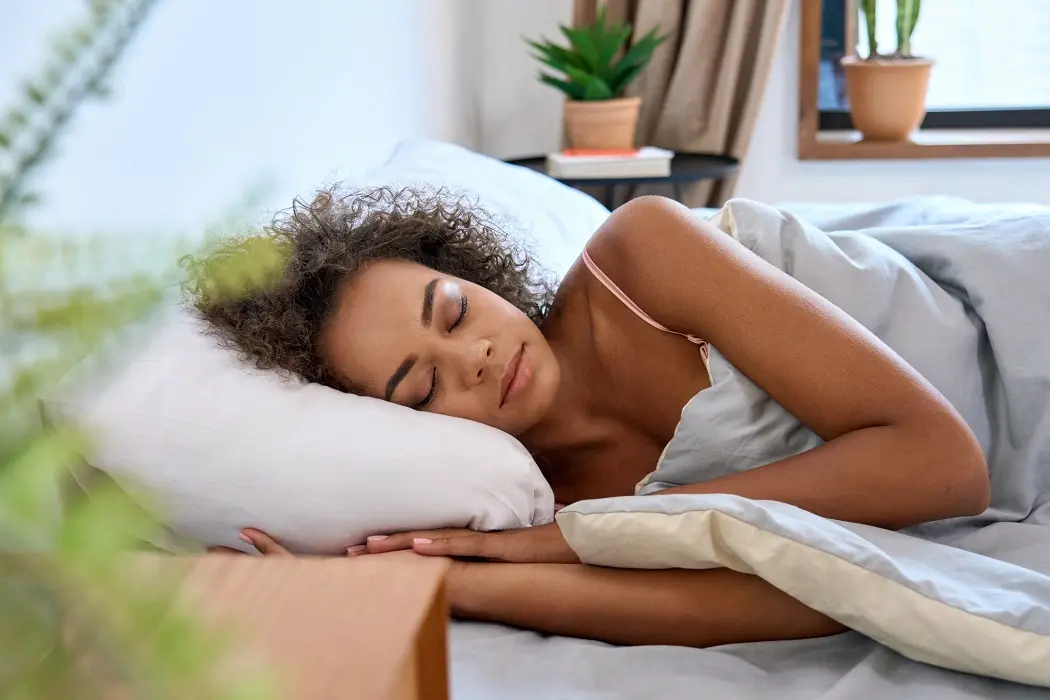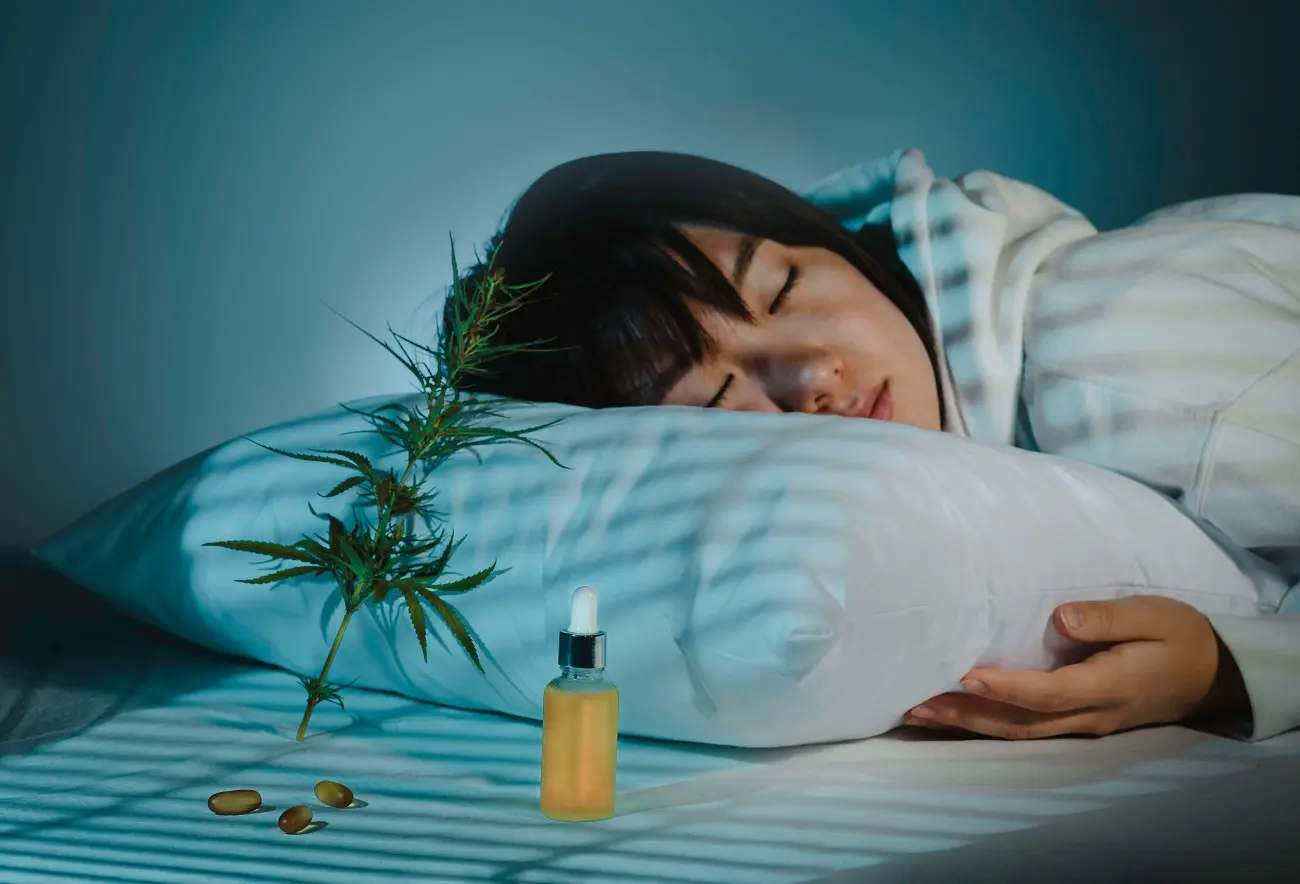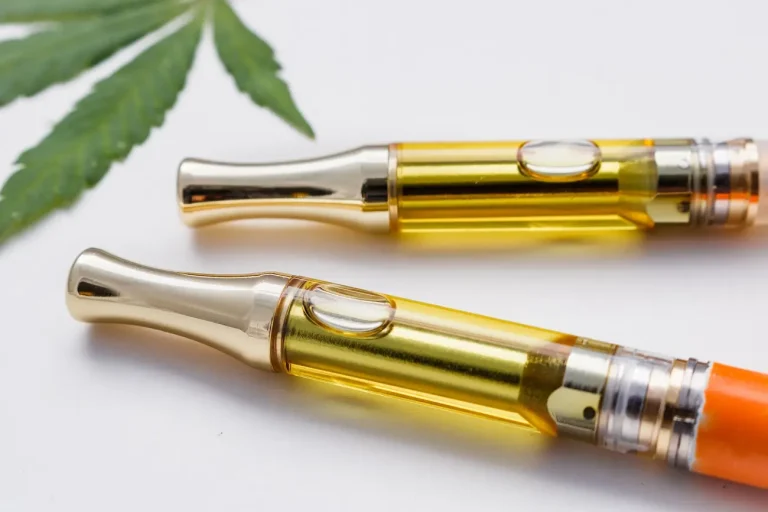- Is Cannabis Good or Bad for Poor Sleep?
- How Does Cannabis Work as a Sleep Aid?
- Benefits of Using Cannabis for Sleep Disorders
- Cannabis as a Sleep Remedy Drawbacks
- What Is the Best Cannabis Product for Sleep?
- Indica or Sativa for Sleep: How to Choose?
- Is Cannabis Different from Natural Sleep Aids?
- Best Tips for Using Cannabis for Sleep Problems
- Have Difficulty Sleeping? Try Medical Cannabis Products at Windy City Cannabis to Fall Asleep Faster!
Cannabis for sleep is commonly used, assisting those with sleep problems to achieve a rem sleep for a more restful night. Whether for recreational use or for medical users, cannabis to sleep can be a useful tool. Around 70% of adults who use cannabis report they use it as a sleep aid, and 85% of users do so for medical reasons, like pain relief; there are many benefits to opting for cannabis to avoid sleep disturbances and fall asleep faster.
While research into cannabis as a sleep aid is still developing, opting for cannabis as your sleep medicine may help relieve occasional insomnia and trouble falling asleep. At Windy City Cannabis, our recreational and medical cannabis dispensary offers a variety of cannabis products to help you with your sleep problems. Here’s how they can help you.
Is Cannabis Good or Bad for Poor Sleep?
So, is cannabis good or bad for sleep? Actually, cannabis for sleep disorders can be quite effective.
For people with certain conditions, including chronic pain, posttraumatic stress disorder, and multiple sclerosis, cannabis has been shown to improve sleep quality, allowing users to fall asleep faster and wake up less. In addition, studies have shown that cannabis can help relieve other symptoms for people while they sleep, like restless legs syndrome.
In particular, studies have shown that those who use cannabis daily are more likely to report increased sleep problems than those who occasionally use it as a sleep aid. Non-daily users showed fewer sleep issues than both daily users and non-users when opting for cannabis as a sleep medicine. With this in mind, while cannabis use can help with sleep, daily usage to improve sleep isn’t recommended. So, is cannabis good for sleep? It depends on how much you use it.
How Does Cannabis Work as a Sleep Aid?

When using cannabis products as sleep aids, the cannabis affects how sleep is structured in the different phases.
The basic sleep stages include:
- Stage 1: When you begin falling asleep.
- Stage 2: Light sleep when your breathing, heart rate, and brain activity begin to slow down.
- Stage 3: Deep sleep, or slow-wave sleep, is the deepest stage of sleep and the hardest to wake up from.
- Stage 4: Also known as REM sleep, this stage is where dreams typically occur.
In a typical night’s sleep, it takes around 70 to 120 minutes to cycle through all the stages. Once you have been through all the stages of the sleep cycle, you begin again at step 1.
With this in mind, some research suggests that cannabis use allows you to spend more time in deep sleep, and less time in REM. This can be beneficial for those who experience bad nightmares. However, REM is important for memory consolidation, pain response, and creativity.
Since cannabis can decrease how long you spend in REM, when you stop using it, your body may spend more time in REM, causing you to miss out on the other stages. With this in mind, cannabis is not ideal for daily use by all users, as you may miss out on your REM cycle.
Benefits of Using Cannabis for Sleep Disorders
Many individuals with sleep disorders opt for alternative remedies, like the cannabis plant, to boost their sleep. While research is still in the early stages, preliminary findings have shown that cannabis may help with sleep, specifically for those with sleep disorders. Here’s why.
1. Inducing Relaxation
Cannabis affects sleep by inducing a state of relaxation, with studies finding it can make it easier for a user to unwind for sleep, getting them in the right mindset to improve their sleep quality. The compounds in cannabis, like THC and CBD, work with the body’s endocannabinoid system, helping promote feelings of calm and tranquility. With this soothing of the mind, cannabis can help reduce tension in the body to create an environment that is more conducive to deep sleep.
2. Reducing Anxiety and Stress
One of the most touted effects of cannabis use is its ability to reduce anxiety and stress. Based on studies, it has been found that particular cannabinoids in cannabis, like CBD< have anxiolytic properties that interact with the receptors in the brain to regulate emotions. With this, smoking cannabis can help reduce anxious thoughts, improving a sense of well-being that can help a person better relax before sleep.
3. Promoting Better Sleep Quality

As we explained before, cannabis use can influence the sleep architecture, which can help promote better sleep quality. When you use cannabis, you can increase your total sleep time, reduce the number of times you awake, and achieve a more deep, restorative sleep. This can make users feel more rejuvenated and refreshed after a night of sleep with cannabis.
4. Managing Insomnia Symptoms
Cannabis and insomnia solutions have been linked, as cannabis can help alleviate the symptoms by targeting the root cause. Insomnia, or difficulty falling or staying asleep, can be caused by several factors, including anxiety, chronic pain, or racing thoughts. Thankfully, cannabis use can help promote relaxation, alleviating these symptoms for a more restful sleep.
5. Alleviating Chronic Pain and Discomfort
Chronic pain and discomfort can significantly impact your sleep, but with cannabis’s analgesic properties, which can provide pain relief, users with chronic pain or other sleep disorders can improve their quality of sleep and sleep duration. This is particularly beneficial for individuals with conditions like arthritis or fibromyalgia.
Cannabis as a Sleep Remedy Drawbacks
While more research has shown that using cannabis can be used for improving sleep in some scenarios, there can be some drawbacks to opting for cannabis as a solution for a sleep disorder. Here are some factors to consider before using cannabis for sleep.
1. Psychoactive Effects of THC

Since THC is a psychoactive compound, cannabis can cause symptoms like euphoria, impaired coordination, and altered perception. For some, these effects may not be ideal for restful sleep, and may even interfere with daily functioning if they experience residual effects. With this in mind, when debating between indica or sativa for sleep, indica tends to be more effective.
2. Impairment of Cognitive Function
For some cannabis users, cannabis can temporarily impact cognitive function. This can affect memory, attention, and problem-solving abilities, which can impact daily functioning. For those taking before bed, it can impact cognitive performance before bed.
3. Dependency and Addiction Risks
Though cannabis is not an addictive substance, using it regularly and consistently can lead to dependency. Many develop tolerances to cannabis, needing greater doses of it to achieve the desired effects. Suddenly stopping use may lead to symptoms of withdrawal, including issues sleeping.
4. Adverse Effects on Sleep Architecture
As mentioned before cannabis and REM sleep problems go hand in hand. While cannabis use can help you sleep longer, it does cause REM sleep repression, which reduces sleep latency, altering the sleep stages. This can affect the overall quality of sleep and can have more long-term consequences when it comes to sleep patterns.
5. Potential Interactions with Medications
Cannabis can have some drug interactions with certain medications, including sedatives, antidepressants, and antipsychotics. When you use cannabis on these medications, you may cause adverse reactions. With this in mind, it’s best to consult a healthcare professional and sleep medicine specialist to ensure that cannabis use is safe with your medications.
What Is the Best Cannabis Product for Sleep?

There are a number of cannabis products to use to improve sleep. The best cannabis product for sleep depends on your preferences, but the top options include:
- Cannabis Gummies: Serving as a delicious dose of cannabis, gummies are a convenient and discreet way to consume cannabis. They are available in a few different formulations to suit your preferences and are designed specifically for sleep support.
- Cannabis Tea: A great addition to a soothing bedtime ritual, cannabis tea can provide a calming experience to your nighttime, creating a soothing bedtime activity that may promote better sleep.
- Cannabis Oil: With precise dosing suggestions, cannabis oil allows for a customizable way to use cannabis for sleep, and provides more fast-acting effects than other solutions.
- Cannabis Strains: Typically, Indica-dominant strains are recommended due to their relaxation and sedating properties, which can assist with sleep.
Indica or Sativa for Sleep: How to Choose?
There are different strains of cannabis available on the market today, with the two most common being Indica or sativa for sleep. Here’s how each strain works.
- Indica: thought to be a more calming strain, and may help promote relaxation and sleepiness. It may also be beneficial for pain management.
- Sativa: considered a more stimulating strain that produces more feelings of euphoria. This acts more as an energy boost, which is best to avoid before bed.
With its calming properties, indica is highly touted as the best cannabis product for sleep. That being said, for those who want to avoid nightmares, sativa may be preferred.
Is Cannabis Different from Natural Sleep Aids?

Since cannabis is categorized as a controlled substance, more research is needed on the safety and efficacy of cannabis sleep aids in order to compare to other sleep aids on the market. Only a few synthetic drugs mimic the benefits of THC and have been approved by the FDA. Typically, these are prescribed for nausea and other symptoms, but not sleep.
With other natural sleep aids, it’s possible that people may opt for medical cannabis to avoid more potent drugs, like opioids. While they may be effective in the short term, prescription, and over-the-counter sleep medications can cause issues with abuse, tolerance, and dependency.
Best Tips for Using Cannabis for Sleep Problems
There are quite a few tips for using cannabis to ensure you improve your sleep and avoid any unwanted side effects. At Windy City Cannabis, we recommend:
- Start Small: Begin with a low dose, around 2 milligrams, to minimize side effects, gradually increasing as needed.
- Use Oral THC: Opt for oral cannabis products when available for longer-lasting effects and quick onset.
- For those struggling to stay asleep: Take an oral dose as soon as you lay your head down to maintain sleep through the night.
- For those struggling to fall asleep: Take an oral dose 1 to 2 hours before bed to help with sleep onset.
- Do not exceed 10 milligrams: To avoid poor sleep quality, avoid higher doses of cannabis.
- Consult with a healthcare professional: For those struggling with significant sleep issues, seek guidance from a knowledgeable professional to get personalized advice and any insight into potential interactions with medications.
- Choose the right strain: When looking at cannabis products, consider the THC and CBD content, the terpene profiles, and what product is most suitable for you.
- Monitor effects: Pay attention to changes in your sleep quality, onset, and duration to see how your cannabis choice is affecting your sleep.
Have Difficulty Sleeping? Try Medical Cannabis Products at Windy City Cannabis to Fall Asleep Faster!
When it comes to cannabis and sleep, Windy City Cannabis has the solution. With a range of options of cannabis for sleep, plus knowledgeable team members to help you find your ideal product, whether a gummy, oil, or tea, we will help you find the right product and strain to boost relaxation with sleep-inducing properties.
To explore our assortment and improve your sleep experience, contact us today to earn more.
Sign Up for Our Rewards Program
Find your perfect cannabis products at Windy City Cannabis. Whether you’re a medical or recreational user, we’ve got you covered.




